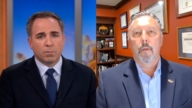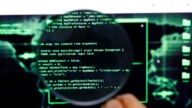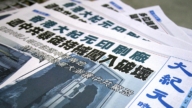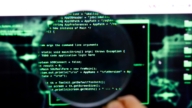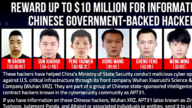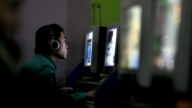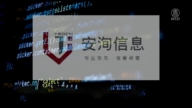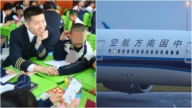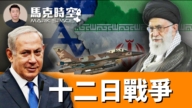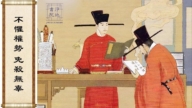【新唐人2012年12月22日讯】最近,大陆官方喉舌媒体频繁发文,呼吁对中国互联网进一步的所谓“依法监管”。《人民日报》也说,管一管网路乱象是多数老百姓愿望。而且12月24号即将召开的全国人大常委会,也将审议关于加强网路信息保护的决定草案。有报导指出,愈演愈烈的“网路反腐”可能引起官方不安,因此通过官媒表态,对这一问题进行降温。
《光明日报》署名文章《要为网路世界设定法治底线》,内容提到,以法治加强互联网监管已是迫在眉睫。而《人民日报》及《新华网》,也相继提出监管互联网或网路反腐的议题。
中共当局大动作,密集释放加强网路监管的信号,让许多访民感觉异常,他们担心未来恐怕连说话的地方都没有了。
权力运动负责人胡军:“刚才北京那边的访民也给我打电话来了,也在说这个事情,现在这些官员们公权无限的膨胀,对中国的百姓进行掠夺,中国百姓说句话都不可以了,一个独裁体制他最害怕就是讲真相,最害怕人们知道他的伪善,揭开他的假面具。”
《人民日报》后续还发文《互联网:依法监管是各国惯例》,文章主要介绍欧美国家对于网路监管的法律和措施。
中国历史教授李元华:“国外监管是两方面,一个是防止网路诈骗,一个防止黄色那种对青少年的,保护青少年的这个是主要的,中共他的所谓封网主要是指言论自由的、是控制人们给老百姓洗脑的、怕人了解真相的、完全性质不一样。”
根据中国互联网络讯息中心(CNNIC)报告,截至2011年12月,中国的网民数量已达到5.13亿人。而在这两年,有关微博反腐的大小事件层出不穷,微博的力量让许多贪官无所遁形。既有天价烟局长周久耕,和表哥杨达才落马,还有房叔蔡彬被移送检察机关等等。
美国之音报导,愈演愈烈的网路反腐可能引起中共当局的不安,因此通过官媒表态,对这一个问题进行降温。也有网民表示,这是“一场有领导、有计划的清场活动”。
而时事观察家华颇认为,微博效应是反映民意,如果中共当局不让民众在网路上发出声音,民众的愤怒不满憋在心里,迟早会爆发成为不可收拾的局面。华颇还表示,网民巨大的力量让执政当局害怕,他估计,中共未来可能会关闭微博。
时事观察家华颇:“出版总署曾经有说不能违反《宪法》法律,这是一条,还有一条是不能攻击党的政策,不能有损国家的荣誉,以及法律规定的其他言论,老百姓不能有异议,只能无条件的服从,《人民日报》发文就说,欧美少数国家绑架了国际电信网路管制的规则,其实不是的,力推这项规则通过的,都是一些缺乏民主的国家。”
据报导,联合国旗下机构国际电信联盟(ITU),在12月初提出《国际通信协议》,希望将来管制互联网。但美国、英国以及加拿大等国家,拒绝签署这项通信协议并反对网路监管。
美国方面表示,在过去24年间,互联网赋予了世界难以想像的财富以及社会效益。一个自由与开放的互联网,已经成为全球性共识。数以百万计的美国人和世界各地的人们,已经发出了他们自己的声音:他们不要ITU(国际电信联盟)管制互联网。美国政府选择站在民意这边。
采访/李韵 编辑/黄亿美 后制/郭敬
Why Chinese Media Send Frequent Signals for Internet Regulations
Anchor:
Recently, Mainland official mouthpiece media frequently
posted to appeal the so-called “China’s Internet supervision according to law."
“People’s Daily" said that managing network chaos
is most people’s wish.
The Standing Committee of the National People’s Congress
will be held on December 24 to consider the draft on strengthening the protection of
Internet information.
Some reports stated that the intensified “network
anti-corruption" may cause officials’ discomfort.
The authorities said to cool down in regards to this issue.
“Guangming Daily" published an article entitled, “An urgent
need to set the bottom line for the Internet” which states strengthening Internet regulations is urgent.
People’s Daily and Xinhua have also raised the issues
of Internet supervision and network corruption.
Intensively releasing signals to strengthen the network
supervision from authorities has surprised many petitioners,
who are worried that there will be no place for them
to speak in the future.
“Rights movement “director Hu Jun: “Just now, petitioners
from Beijing were calling me.
They said that officials expand their power and rob
ordinary people, who are not allowed to speak anymore.
What a dictatorship is afraid most of is truth clarifying.
It fears most that people will lift its mask to reveal
its hypocrisy.
“People’s Daily", also published an follow-up article
introducing laws, measures, and the network supervision practices of Europe and the US.
Chinese history professor Li Yuan-Hua: “Foreign regulations
are two-fold, one is to prevent phishing scams, and another is to prevent pornography from reaching young people.
Protection for the young is the main goal.
The Chinese Communist Party’s (CCP) censorship
is mainly to limit the freedom of speech, control people,
brainwash people, and prevent truth clarifying.
Its nature is totally different.
As of December 2011, according to the China Internet
Network Message Center (CNNIC) report, the number of Internet users in China has reached 513 million people.
In the past two years, “microblogging corruption" incidents
occurred one after another.
Microblogging has been so powerful that many corrupt
officials were sent to prosecutors.
For example, Zhou Jiugeng for high cigarette prices, Yang Da
for named brand watches, and Cai Bin for houses.
“Voice of America" reported growing network corruption
may cause the authorities unrest.
The authorities asked for a cooling down on this issue.
Netizens said that it is a well planned environmental
cleansing activity.
Current affairs observer Hua Po: “Microblogging reflects
public opinion.
If the CCP doesn’t allow people to air their opinions
on the Internet, their anger simmers inside.
Eventually the situation would become unmanageable.
He also believes that authorities are afraid
of Netizens’ power.
He estimates that the CCP will shut down microblogging.
Hua Po: “The Publication Administration said that one can’t
violate the laws of the Constitution, and
one can’t attack the party’s policies,
can’t disgrace the country or law,
people can’t have different opinions, but
only unconditional obedience.
People’s Daily issued a document said that a few European
countries and the US have kidnapped Internet regulations.
In actuality, the countries that pushed this rule are those
countries that lack democracy.
It has been reported that agencies of the United Nations’
International Telecommunication Union (ITU) proposed,
in early December, an international communication protocol
to regulate the Internet in the future.
However, the United States, Britain, Canada and other
countries refused to sign the communication protocol and oppose Internet regulations.
The United States said that in the past 24 years, the Internet
has given the world unimaginable wealth and social benefits.
A free and open Internet has become a global consensus.
Millions of Americans and people around the world
have spoken: they do not want to regulate the Internet ITU (International
Telecommunication Union).
The US government has chosen the side of public opinion.



